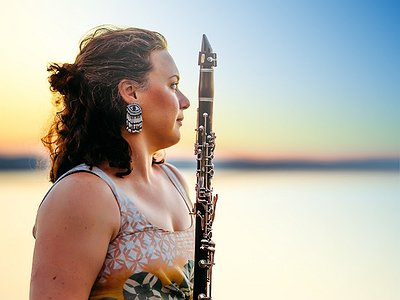Part 1
Name: Kristen Mather de Andrade
Nationality: American
Occupation: clarinettist
Current Release: As Bright as the Skies Are Blue
Recommendations: Brazilian visual artist Rita de Souza, who makes wonderfully detailed drawings and emotional installations in particular “5 Marias Não Manipuláveis” /David Krakauer and Kathleen Tagg’s “Mazel Tov Cocktail Party”
If you enjoyed this interview with Kristen, learn more on her website,
When did you start writing/producing/playing music and what or who were your early passions and influences? What was it about music and/or sound that drew you to it?
I’ve been playing for most of my life. Before I joined the school band on clarinet in middle school, I played the recorder and piano at home with my mother. There was always music in the house (especially show tunes), and I was drawn to it. Once I had access to instruments, I couldn’t stop playing and became obsessed.
Some people experience intense emotion when listening to music, others see colours or shapes. What is your own listening experience like and how does it influence your approach to music?
It really depends — and so much of it depends on how you’re feeling at the time and how the music will touch you in that moment. I’ll have an intense reaction to a piece one month and the following month I may just enjoy it — but without the same intensity. I think this speaks to how music can be part of your emotional journey and guide you through different stages in your life.
How would you describe your development as an artist in terms of interests and challenges, searching for a personal voice, as well as breakthroughs?
I was trained classically, playing with techniques and interpretations that can be considered by some as rigid. I think this was important to me in my more formative years as an instrumentalist because it laid out the framework for consistency in execution that helped me refine my playing and win an audition for a full time playing gig. After being in that position for about 9 years, I was able to work with someone from a different playing tradition who helped me conceptually let go of some of the rigidity from my training and encouraged me to find my own voice. It was around that time that I also started singing professionally — and I think that convergence of events shaped the way that I have been playing now.
Tell me a bit about your sense of identity and how it influences both your preferences as a listener and your creativity as an artist, please.
I’m at an age where I’m looking back on the years that I’ve been playing this instrument and remember much more than the music. I remember the relationships (good and bad), the discomfort and the joy, and all of the time spent wondering if I’m making the right choices and being true to myself. These are journeys any artist will make and their art is often a way to work through ideas — and many times it is a reflection of that time in their life. I listen to a lot of different styles of music — and what I am drawn to is an approach that comes across as genuine.
What, would you say, are the key ideas behind your approach to music and art?
I think the best thing any artist can do is stay interested. It’s harder than it sounds as life drags us in different directions, but it is at the core of artistic development.
How would you describe your views on topics like originality and innovation versus perfection and timelessness in music? Are you interested in a “music of the future” or “continuing a tradition”?
As you may have guessed, my training was in a conservatory tradition. There is a lot of good that I got from that training — it's tough, there are high standards, and I really learnt to take music seriously. Being a musician is a path that so few get to travel down, and I think it is important to honour the opportunity of playing professionally with our best performance… but I also love new music, music from different traditions, and the challenge of programming for any kind of audience I have the chance to be in front of. I think the best approach for me is to always bring my best to a situation, appreciate the many ways I've experienced music making, and find opportunities to share what I love to perform.
Over the course of your development, what have been your most important instruments and tools — and what are the most promising strategies for working with them?
I have always looked for people who I admired for one reason or another and tried to build a relationship with them. Formally or informally, a community of people you admire and trust can be an excellent sounding board - not to mention you will then have the joy of reciprocating. I think feeding off each other's creative energy and expertise is a wonderful way to develop.
Take us through a day in your life, from a possible morning routine through to your work, please.
Probably like most musicians, I don't have a super predictable schedule. What I try to get done every day is some kind of physical exercise and cooking. I really try to keep a routine that supports me physically and mentally so I can be prepared for what the day holds, especially when life gets more hectic.





